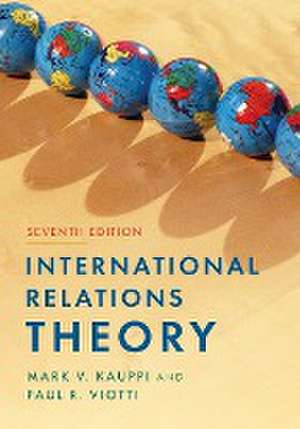International Relations Theory
Autor Mark V. Kauppi, Paul R. Viottien Limba Engleză Paperback – 8 aug 2023
| Toate formatele și edițiile | Preț | Express |
|---|---|---|
| Paperback (1) | 453.73 lei 6-8 săpt. | |
| Globe Pequot Publishing Group Inc/Bloomsbury – 8 aug 2023 | 453.73 lei 6-8 săpt. | |
| Hardback (1) | 764.78 lei 6-8 săpt. | |
| Rowman & Littlefield Publishers, Inc. – 15 aug 2023 | 764.78 lei 6-8 săpt. |
Preț: 453.73 lei
Preț vechi: 589.25 lei
-23% Nou
Puncte Express: 681
Preț estimativ în valută:
86.82€ • 92.84$ • 72.39£
86.82€ • 92.84$ • 72.39£
Carte tipărită la comandă
Livrare economică 17 aprilie-01 mai
Preluare comenzi: 021 569.72.76
Specificații
ISBN-13: 9781538171493
ISBN-10: 153817149X
Pagini: 480
Dimensiuni: 178 x 254 x 26 mm
Greutate: 0.9 kg
Ediția:Seventh Edition
Editura: Globe Pequot Publishing Group Inc/Bloomsbury
ISBN-10: 153817149X
Pagini: 480
Dimensiuni: 178 x 254 x 26 mm
Greutate: 0.9 kg
Ediția:Seventh Edition
Editura: Globe Pequot Publishing Group Inc/Bloomsbury
Notă biografică
Mark V. Kauppi is associate adjunct professor with the School of Foreign Service at Georgetown University. He retired from the Defense Intelligence Agency in 2016 after a thirty-year career which included assignments as professor at the National Intelligence University and chief of a Department of Defense/intelligence community counterterrorism training program for analysts and managers.
Paul R. Viotti is professor at the Josef Korbel School of International Studies, University of Denver. His expertise is in the areas of foreign policy, national security, and international relations theory. A retired colonel in the U.S. Air Force, Viotti has also been a member of the Denver Council on Foreign Relations, its president (1993-2003), Vice Chair (2003-17) and emeritus board member (2017-present). He is also on the Board of Advisors of the Inter-University Seminar on Armed Forces & Society.
Paul R. Viotti is professor at the Josef Korbel School of International Studies, University of Denver. His expertise is in the areas of foreign policy, national security, and international relations theory. A retired colonel in the U.S. Air Force, Viotti has also been a member of the Denver Council on Foreign Relations, its president (1993-2003), Vice Chair (2003-17) and emeritus board member (2017-present). He is also on the Board of Advisors of the Inter-University Seminar on Armed Forces & Society.
Cuprins
Chapter 1 Thinking About IR Theory
Part I: The Intellectual Roots of International Relations Theory [formerly Part 3]
Chapter 2: The Ancients: Greeks, Chinese, and Indian Thought
Chapter 3: Greco-Roman Thought and the Middle Ages
Chapter 4: The Rise of the State and Modern Political Thought
Part II: Images of International Relations Theory
Chapter 5: Realism: The State and Balance of Power
Chapter 6: Liberalism: Interdependence and Global Governance
Chapter 7: Economic Structuralism: Global Capitalism and Postcolonialism
Chapter 8: The English School: International Society and Grotian Rationalism
Part III: Interpretive Understandings & Normative Considerations
Chapter 9: Constructivist Understandings
Chapter 10: Positivism, Critical Theory, and Postmodern Understandings
Chapter 11: Feminist Understandings in IR Theory
Chapter 12: Normative IR Theory: Ethics and Morality
Glossary
Part I: The Intellectual Roots of International Relations Theory [formerly Part 3]
Chapter 2: The Ancients: Greeks, Chinese, and Indian Thought
Chapter 3: Greco-Roman Thought and the Middle Ages
Chapter 4: The Rise of the State and Modern Political Thought
Part II: Images of International Relations Theory
Chapter 5: Realism: The State and Balance of Power
Chapter 6: Liberalism: Interdependence and Global Governance
Chapter 7: Economic Structuralism: Global Capitalism and Postcolonialism
Chapter 8: The English School: International Society and Grotian Rationalism
Part III: Interpretive Understandings & Normative Considerations
Chapter 9: Constructivist Understandings
Chapter 10: Positivism, Critical Theory, and Postmodern Understandings
Chapter 11: Feminist Understandings in IR Theory
Chapter 12: Normative IR Theory: Ethics and Morality
Glossary
